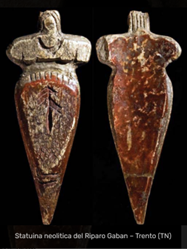Tanna, Queen of the Crodères: A Neolithic Folktale

Several years ago my son and I went hiking through the Lavaredo Pass, high in the Dolomites. It was warm down in the valley, but as we went higher, the temperature dropped considerably despite the sunny weather.
As we climbed, we came upon the remnants of trenches, fortifications and tunnels that had been made during World War I. The land is still scarred from shelling during the conflict. I had not known about this place having been a strategic front.
It wasn’t tourist season, the “rifugio” or mountain refuge was closed and there was absolutely no one around us. The silence was profound, and all that could be heard was the wind, the crunch of our boots as we walked ever higher, the odd chirp of an unseen bird and very occasionally the sound of pebbles cascading down the mountainside.
Later, returning to my friend’s home in Treviso, I asked her about the place we had been. Rather than tell me of the war, she told me one of the oldest tales I ever heard.
Not Your Usual Folktale
What I was told differed from most “traditional” folk and fairy tales, which, as we all know, tend to have certain commonalities.
One of the most frequent is where the protagonists “live happily ever after”. Often these protagonists will have to complete seemingly impossible or very difficult tasks in order to achieve their goals. Advice is sometimes provided by a strange character — an older woman, an unusual man, or a mysterious otherworldly entity. Sometimes advice or tribulations involved animals or Nature.
This very, very old story — likely dating from the Neolithic — does not have these usual plot devices.
The story comes from the Italian Alps, and likely would have been familiar to Otzi the “Iceman”.
Here are the characters in this not-exactly-a-morality tale:
- Tanna — Queen of the Crodères
- The Crodères — Sons or Men of the Croda (Croda is a Veneto or Ladin term and refers to a specific and prominent type of rock formation in the Dolomites).
- The Wind — An entity who wanted to mate with Tanna
- The Count of Aquileia — Father of Tanna’s child
- The Oldest Male of the Crodères
- Salvanel — Son of Tanna and the Count of Aquileia
- Marcora — Daughter of the Count of Aquileia and his human wife, step sister to Salvanel, or - depending on the version of the story - the daughter of an enemy of the Count of Aquileia
(To those of you who read my essays, you might recall another Salvanel. A different story, but likely related.)
The Story of Tanna, Queen of the Crodères

In the high Dolomite Marmarole, at the top of the highest peak, called Cimon del Froppa, there is an ice palace; the home of the Crodères. These ancient entities, the Sons of the Croda (a Venetian and Ladino word for “rock”) lived there. The Crodères looked very much like human beings but inside their hearts were made of stone. They never felt pain, desire, sorrow or love. Neither malevolent nor benevolent, they went about their own unknown and inscrutable business and did not interfere with humans.
Legends from later times spoke of a special day — The Day of the Calm — at the Cimon del Froppa. One day per year everything would be completely still — no leaf would tremble on any tree, no snowflake would fall, no breeze would stir the air. And on that day a cleft would open in the mountain and men could enter inside the earth and take whatever treasure laid there. There was nothing to fear on this one special day.
Sometimes enterprising miners would delve deeper into the mountain. They told of reaching a remote hall where a woman sat between two golden coffins. Dressed in black, her face was veiled and on her head she wore a blue tiara.
This was Tanna, Queen of the Crodères.
The story does not tell of Tanna’s origins, her parentage or family. It was said that although she was a creature of the Crodères, for unknown reasons they decided to give her a human heart. Or perhaps she already was part or completely human.
Her story begins when she was ten years old and was chosen to become the Crodères’ queen. She was given a magical and powerful blue tiara, which gave her the ability to control avalanches and rockfalls, winds and water. Her role was to “manage” these natural events and, among other things, prevent excessive weight from building up upon the slopes. Her sacred duty was to keep nature in balance.
The Crodères quickly regretted their decision. The young queen grew closer to humans. She was reluctant to do her duty and she sided with men who implored her to stop avalanches, to prevent the Wind from blowing too strongly and to keep the rivers from flowing too strongly. The men worshipped her for doing their bidding, but meanwhile the snows piled up on the mountains, the weight pressing dangerously onto them.
The Crodères were dismayed in their unemotional way. They pointed out to Tanna that it wasn’t the avalanches not falling or any of the other events of nature she prevented from happening that was giving her pleasure — they told her she was succumbing to the flattery of men and warned her “Beware of finding yourself among Men without your power”.
But Tanna was young and headstrong, and decided to leave her people and live among men.
Tanna grew up, becoming a beautiful woman. Even the strong mountain Wind was enchanted by her, and proposed marriage — he explained the power of their potential alliance. But Tanna was uninterested, still held in thrall of the worship of Men — and she refused the Wind three times.
Years passed. While walking through the mountain valleys, Tanna encountered a handsome man hunting in the area; the Count of Aquileia. Completely besotted, Tanna told the general assembly of the Crodères that she wanted to marry this man.
The Crodères were appalled and told her she was not to marry a human being. But Tanna was determined and stated that she would marry him whether they approved or not. At this, the Crodères summoned their eldest, a being who now lived separately from all and who had never even met Tanna. This elder had powers beyond most of the Crodères and, oddly, still had a human heart — although it was deeply bitter. He alone had the ability to curse the enemies of the Crodères.
They brought the elder to the assembly, but when he gazed into Tanna’s eyes, he recalled older times, other blue eyes and blond hair, and was unable to curse her. All he managed to do was declare that she must relinquish her tiara, decree that she must go and live along men until her destiny unfolded. And then, in that moment, he died.
Meanwhile, Tanna had not disclosed to the Crodères that she was already pregnant.
Expecting a child and now without her tiara and her powers, she went to live in a small and humble hut in the valley. Her son was born there. Tanna had him breathe the purest and coldest air of the mountain, ensured he absorb the energy of the sun and fed him firn (Firn is a dense, granular snow that has survived two seasonal melts and is transitioning to solid ice; the word comes from the German "fern" which means "of last year").
She named the boy Salvanel and told him stories of his noble father — how handsome he was, how powerful and worthy — and how he would soon come to them. The Count, said Tanna, would marry her and claim Salvanel as his own.
Tanna tells Salvanel to the patient; the Count would come soon.
But the boy grew and became impatient. He begged his mother for permission to go to Aquileia to seek out his father. Tanna demurred, and continued to repeat that Salvanel must be patient. Furthermore, she entreated him not to leave her alone.
However one morning Tanna awakened to find her son was gone and likely on his way to Aquileia.
Once Salvanel arrived in Aquileia he sought and easily found the Count, hoping that he will come to live with him and his mother, or allow them to live in the court of Aquileia. Alas, the Count was already married to another woman and denied any knowledge of Tanna or her son. He then sent his guards to chase Salvanel out of town.
Salvanel, angered and devastated, challenged his father to combat. It did not go well for the battle-inexperienced Salvanel and the Count, his father, wounded him (or, according to some versions of the story, Salvanel aligned himself with an enemy of the Count, entered into battle, and was then wounded).
These events were witnessed by Marcora, the daughter of the Count (and half-sister to Salvanel). She then brought Salvanel to her home, healed his wounds and fell in love with him. Unwisely, Marcora went to her father to declare her love for Salvanel. The Count, infuriated, locked her in a high tower (in some versions, Marcora is the daughter of the enemy of the Count, and it is he who disapproved of the match and locked her in his tower).
Regardless of which tower, Salvanel managed to help Marcora escape and the two began their journey as fugitives, attempting to reach Tanna in the mountains. But the soldiers of the Count were in hot pursuit.
While Salvanel was on his losing quest to seek out his father, Tanna found herself alone for the first time in her life. She had no compatriots, her son was gone, she had lost her powers and, in having no power, had lost of loyalty of humans. While contemplating her sad fate, she observed the immense amount of snow that had accumulated on the mountain.
Then, at that moment, she heard a cry: It’s Salvanel, calling from the base of Cimon del Froppa. He’s crying for her help — but there was too much snow, and he (along with Marcora) could not climb up to safety. His pursuers were getting closer.
Tanna was overwhelmed with happiness to see and hear her son, but was frantic. She needed an avalanche but could no longer control the powers needed to make this happen. Desperate to find a solution, she ran back to the Crodères. She spoke to them, asking for their forgiveness in having taken her duties too lightly. She admitted that she was foolish and wrong, and she begged them to allow the avalanche to happen and so release the mountain so oppressed with the weight of the snow.
The Crodères immediately and dispassionately understood what was behind Tanna’s speech. They reminded her that they didn't hold the power to let the avalanche fall; only the person wearing the blue tiara, the Queen of the Crodères, could make this happen, And, due to her own decisions, the position was vacant.
Tanna was beside herself; she confessed her entire story, explained everything in detail, but to no avail. The Crodères were unmoved and suggested that Tanna ask Men for help, since she had chosen to live among them.
She returned to Cimon del Froppa, and to her relief she saw that Salvanel and Marcora had somehow managed to climb very close to home. Marcora was hoisted to safety, but when Tanna reached down to grasp the hand of Salvanel, her strength failed. He fell into a crevasse and died.
There was nothing more to do other than wait, as Tanna knew sooner or later the glaciers always give back the bodies of the fallen. Once again, Tanna resolved to be patient. Together with Marcora, she went to live at Pian della Gravina where the edge of the glacier pushes ever forward, relentlessly devouring all the land and pasture before it. The glacier has become immense because of the neglect of the Queen of the Crodères; the local shepherds are dismayed because there is less and less pasture to feed their flocks.
This was blamed upon Tanna and Marcora. The shepheards call them the two ice witches (dòi strìes de la yàtha).
Despite the animosity of her neighbours, Tanna and Marcora continued living near the edge of the glacier and each day went to see if the body of Salvanel would be released. And one day, the dead and crushed body of the young man was exposed. And Marcora, in her grief, died immediately.
Tanna wailed her sorrow to the mountains, and the shepherds now realized who she was — not a witch, but… “It's Tanna, the Queen of the Crodères!”, they cried.
At this moment, Tanna realized the folly of her life and decided to reinstate herself as the Queen. As a last gesture of kindness to humankind, she warned the shepherds and villagers that an avalanche would soon come and that they should move to safety. Tanna then made her way back to her kingdom of the Crodères.
And so, the destiny that the Old Crodère had predicted, caught up with Tanna. Out of respect, the Crodères made two golden coffins for Salvanel and Marcora; and Tanna then took her place, once again as Queen, seated between the two.
And her heart was turned to stone.
So on the quiet day — The Day of Calm — men would be allowed to take what they wanted or needed from the mountains. This was Tanna's final gift to the men who ultimately betrayed her. And on this day only, Tanna’s heart would become human once more, and she would feel once again the sorrow of her plight and the agonies of betrayal.
Then her heart would turn back to stone.
Would you like to read other posts? If so, please click the Home Page link below:

You, Dear Reader, are much needed and appreciated.
Everything written requires a reader to make it whole. The writer begins, then you, dear reader, take in the idea and its image, and so become the continuation of its breath. Please subscribe so that my words can breathe. Consider this my hand, reaching out to yours.
